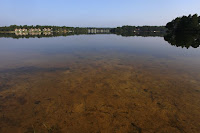A helicopter will be flying over Presque Isle State Park on Wednesday, October 10 applying herbicide to 170 acres of land inundated with two invasive plant species. The invasive species are Narrow-leaf Cattail and Phragmites. The presence of these plants is damaging to the native plants as well as the overall habitat and ecosystem health of the park.
READ MORE

















